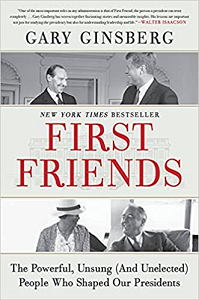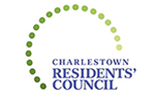Last Updated on August 19, 2021

Resident Ken Weeden’s review of First Friends: The Powerful, Unsung (And Unelected) People Who Shaped Our Presidents by Gary Ginsberg [New York:Hachette, 2021], is scheduled for Tuesday, September 21, 2021 at 7 PM in the Auditorium.
If you want a friend in Washington, get a dog. Presidents are often surrounded by those who seek prestige and idol worshippers. True friends are hard to find. In First Friends, Gary Ginsberg discusses nine presidents who had lifelong, close friends who stood by them throughout their lives. Mostly out of public view, they listened, provided emotional support, helped them relax during times of national crises, and in some cases, became involved in presidential decision making.
Consider Abraham Lincoln and his BFF, Joshua Speed. They met in 1837, and hit it off immediately. When Lincoln faced depression and even thoughts of suicide, Speed stayed with him, and later encouraged him to enter politics. Speed was at Lincoln’s inaugural, provided quiet advice throughout the Civil War, and most importantly was instrumental in keeping his home state of Kentucky from seceding.
On the other hand, FDR’s first friend was a distant relative, Daisy Suckley who was there when Roosevelt contracted polio and felt his life not worth living. She was there throughout his 12 years in office, not to provide advice, but to help him relax, to laugh with him and to forget, at least for few hours the terrible burdens on his shoulders. She was there at Warm Springs when he died.
Eddie Jacobson and Harry Truman met in 1903, and over the next few years they became close friends. Jacobson encouraged Truman to enter politics. Once president, Truman often invited Jacobson to the White House and staff were told to put calls through from Eddie without delay. In 1948, Truman’s advisors were divided over recognition of Israel, Secretary of State George Marshal was emphatically against it; the nation was divided. Eddie Jacobson met with Truman and convinced him it was the right thing to do.
Perhaps no best friend had greater political influence than David Ormsby-Gore. He met Jack Kennedy in London in 1938. They both loved to discuss politics, political theory, and history. More than 20 years later, Jack Kennedy became president and he asked the British Prime Minister to appoint Ormsby-Gore as his ambassador to the United States. He often provided advice, not as the British Ambassador, but as a personal friend. During the Cuban Missile Crisis, Kennedy trusted no one’s opinion more than Ormsby-Gore and his brother Robert Kennedy.
Gary Ginsburg also examines the “first friends” of Thomas Jefferson, Franklin Pierce, Woodrow Wilson, Richard Nixon and Bill Clinton. Each played a role in shaping America then and now.
Author Gary Ginsberg grew up in Buffalo, New York, home of two U.S. presidents and has had a career in journalism, media and politics.
Ken Weeden is a former history teacher and frequent reviewer of books about history and social justice.
Janet Neer and Ellyn Loy, Book Review Coordinators
